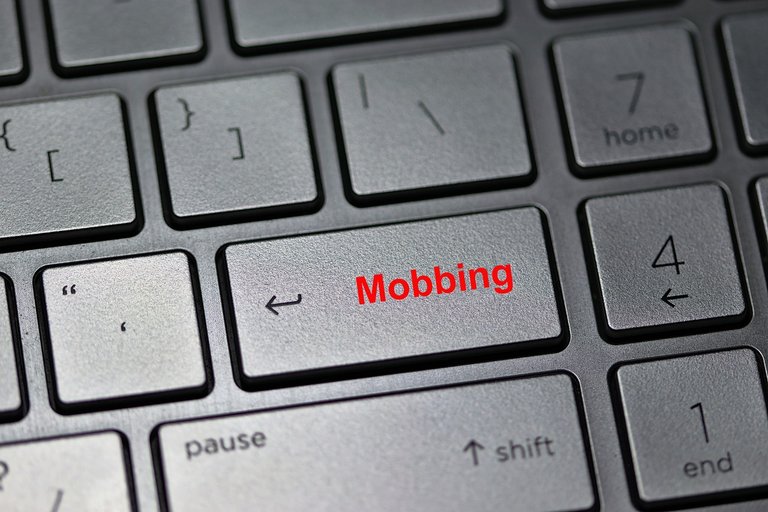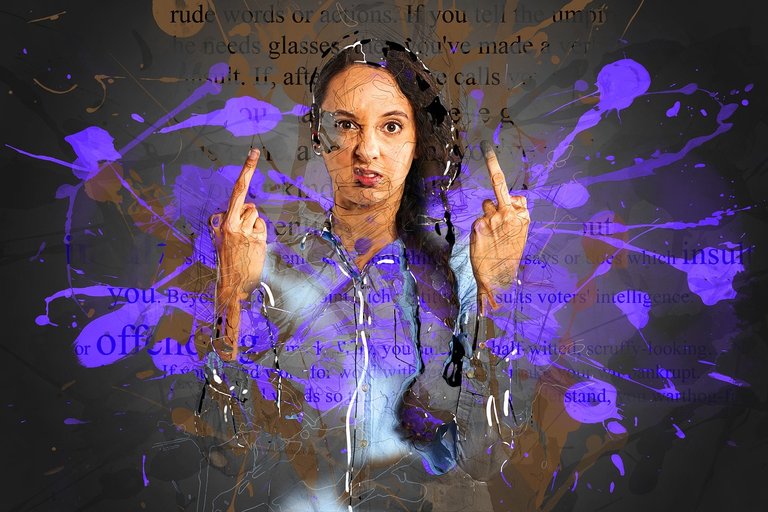How does an insult work? / ¿Cómo funciona un insulto? (Esp-eng)
Hello, friends at @holos-lotus.
Since childhood, everyone remembers the insults they've received throughout their lives. They can take many forms and be accompanied by many emotions on the part of those who say them: mockery, hatred, even surprise. We remember the emotional pain we received from them, pain we have embarked on the task of managing throughout our lives.
Sigmund Freud hypothesizes that the first human being to insult another instead of throwing a stone created civilization.
And it's almost certainly true.
What is true is that there is a phase of childhood in which we react with physical violence to what bothers us, and then we replace that reaction with verbal violence.
But it is also true that not everything considered an insult is insulting. There is a typical comedy situation where a word that isn't an offense becomes one for those who don't understand it. It is also possible to see how adults playfully tell children things that would be offensive, and how the child responds jokingly with even worse insults, or the same ones, which they often don't understand, but none of them seem to be feeling emotional pain from it.
There are also a series of "forbidden" words, which are insults or not depending on the skin color, sex, and even the country of the person saying them. There are even words that may have started as insults and then transformed into compliments.
So, how does insult work? Knowing this could be useful in defending ourselves against this type of aggression.
The first idea might be that something is inherently offensive and will cause emotional damage to anyone it is directed at, and the only person to blame is the one who makes the gesture or says the words that offend us. The solution, then, is to punish whoever says it and turn them into linguistic taboos. But that explanation, while it may please us because it demands nothing of us, is not only flawed in practice, but also misunderstands how language works.
Language is a mechanism of communication between individuals. A complex mental process produces a word that has been learned to mean something. When another person reads it, a complex mental process, based on what they have learned that word means, relates it to certain things they are thinking about. The word, in and of itself, is just an image or a sound with no implicit meaning. It is people who agree, through adoption and use, that it means something. Thus, it is incorrect to say that words convey a message, when rather, they provoke it.
This means that every expression we consider offensive has a kind of programming in our brain to lead us to reactions of pain or emotional disgust. If they led us to a reaction of laughter, or happiness, they would no longer be insults to us. It is this programming that insults us. All the word does is activate it.
Does this mean that our brain tortures itself for pleasure? No, since there is a link between verbal and physical violence. But if no one in front of us is going to beat us up, cursing at what we consider an insult is of little use to our physical health, and it's bad for our mental health.
Part of the insult programming comes from our community. They've taught us, through various means, almost always repressive, to react this way to certain words. But another part of that programming is self-constructed. If we have self-esteem issues, we may be offended by people telling us how we look. Considering someone else our enemy, we may begin to consider much of what they say a personal attack, even if it isn't. In extreme cases, we may begin to twist what they say to find something we dislike and accuse them of.
At that point, communication becomes a minefield. The other person, seeing that anything can upset us, feels as if they're walking through a minefield, and sooner or later they'll try to avoid us or use euphemisms, which in turn can be considered insulting behavior. Communication loses its naturalness.
And if institutions or groups seeking economic or political gain intervene, then this insult programming will be amplified in social spaces to large numbers of people increasingly dominated by negative emotions that erupt from all sides.
Although, it is not something that is simple. The only lasting solution to insults is to deprogram ourselves so that they stop insulting us. It requires recognizing that, while we may be the victims, we are also responsible for whether or not we are offended by what they say to us. Repressing others from using certain words or expressions will not solve the problem, because that programming will remain there, installed in our minds, ready to react, and looking for ways to spread.
We should not run away from what offends us, but rather redefine it, changing the emotion we carry with it. If we succeed, the emotional pain will disappear, and others, even if their intention is to offend us, will only succeed in amusing us or leaving us indifferent.
No matter how hard we try, there will always be something that bothers us to hear, but one of our tasks to live a more peaceful life is to clear our minds of negativity, erasing the mental habits that cause it. Insult programming is one of them.
Versión en español
Hola, amigos en @holos-lotus.
Desde niña, cualquiera recuerda los insultos que ha recibido a lo largo de su vida. Pueden tomar muchas formas, y ser acompañados de muchas emociones por parte de los que los dicen: burla, odio, incluso sorpresa. Recordamos el dolor emocional que recibíamos de ellos, dolor que nos hemos embarcado en la tarea de manejar a lo largo de nuestra vida.
Sigmund Freud supone que el primer humano que insultó a otro en vez de tirarle una piedra creó la civilización.
Y lo más posible es que sea verdad.
Lo que sí es cierto es que existe una fase de la infancia en la que reaccionamos con violencia física a lo que nos molesta, y luego esa reacción la sustituimos por violencia verbal.
Pero también es cierto que no todo aquello considerado insulto, insulta. Existe una situación típica de comedia donde una palabra que no es una ofensa llega a serlo para el que no la entiende. También es posible ver cómo los adultos juegan con algunos niños a decirle cosas que serían ofensivas, y como el niño les responde en broma, con insultos todavía peores, o los mismos, que muchas veces no entiende, pero ninguno parece estar sintiendo dolor emocional por eso.
También existen una serie de palabras “prohibidas”, que son insultos o no según el color de piel, el sexo e incluso el país de quien lo diga. Incluso hay palabras que pudieron haber empezado como descalificativos y luego se transformaron en elogios.
Así que, ¿cómo funciona el insulto? Saberlo pudiera ser útil para defendernos de este tipo de agresión.
La primera idea pudiera ser que algo es ofensivo de por sí y que producirá un daño emocional en cualquiera a quien sea dirigido, y el único culpable es aquel que hace el gesto o dice las palabras que nos ofenden. La solución es, pues, castigar a quien la diga y volverlas tabúes lingüísticos. Pero esa explicación, aunque pueda complacernos, porque no exige nada de nosotros, además de fallar mucho en la práctica, no comprende cómo funciona el lenguaje.
El lenguaje es un mecanismo de comunicación entre individuos. Un complejo proceso mental produce una palabra que ha aprendido que quiere decir algo. Cuando otra persona la lee, un complejo proceso mental, a partir de lo que ha aprendido que quiere decir esa palabra, la relaciona con determinadas cosas en las que piensa. La palabra, de por sí, es solo una imagen o un sonido sin significado implícito. Son las personas las que se ponen de acuerdo, por adopción y uso, para que signifique algo. Así, es incorrecto decir que las palabras transmiten un mensaje, cuando más bien lo provocan.
Eso significa que cada expresión que consideramos ofensiva, tiene una especie de programación en nuestro cerebro para llevarnos a reacciones de dolor o desagrado emocional. Si nos llevaran a una reacción de risa, o felicidad, ya no fueran insultos para nosotros. Es esa programación la que nos insulta. Lo único que hace la palabra es activarla.
¿Significa eso que nuestro cerebro se tortura por gusto? No, puesto que hay una vinculación entre violencia verbal y física. Pero, si nadie frente a nosotros va a caernos a golpes, insultarse ante lo que consideremos un insulto tiene una utilidad bastante escasa para nuestra salud física, y es malo para nuestra salud mental.
Parte de la programación del insulto viene de nuestra comunidad. Ellos nos han enseñado, por diversos medios, casi siempre represivos, a reaccionar así a determinadas palabras. Pero otra parte de esa programación nos la construimos nosotros. Al tener algún problema de autoestima, es posible que nos ofendan que nos digan cómo lucimos. Al considerar a alguien más nuestro enemigo, mucho de lo que diga lo podemos empezar a considerar un ataque personal, aunque no lo sea. En extremos, podemos empezar a tergiversar lo que nos dicen para hallar algo que nos desagrada y acusarlos.
En ese punto, la comunicación se convierte en un campo minado. La otra persona, al ver que cualquier cosa nos puede molestar, siente como si caminara por un campo minado, y tarde o temprano tratará de evitarnos o utilizar eufemismos, lo cual a su vez puede ser considerado una conducta insultante. La comunicación pierde su naturalidad.
Y, si instituciones o grupos en busca de rédito económico o político intervienen, pues tendremos que esa programación del insulto se amplifica en espacios sociales a grandes cantidades de personas cada vez más dominadas por emociones negativas que saltan por cualquier parte.
Aunque no es algo que sea sencillo, la única solución duradera al insulto es desprogramarnos para que deje de insultarnos. Requiere reconocer que, si bien podemos ser las víctimas, somos también responsables de ofendernos o no de lo que nos dicen. Reprimir a los demás para que no digan determinados glosarios de palabras o expresiones no nos va a solucionar el problema, porque esa programación seguirá allí, instalada en nuestra mente, lista para reaccionar, y buscando formas de extenderse en nuestra cabeza.
No debemos huir de aquello que nos ofende, sino resignificarlo, cambiarle la emoción a la que lo llevamos. Si lo logramos, el dolor emocional desaparecerá, y los demás, aunque sea su intención ofendernos, solo conseguirán divertirnos o dejarnos impasibles.
Por mucho que lo intentemos, siempre habrá algo que nos moleste escuchar, pero una de nuestras tareas para vivir una vida más pacífica consiste en limpiar nuestra mente de negatividad, borrando aquellos hábitos mentales que la ocasionen. La programación del insulto es uno de ellos.


